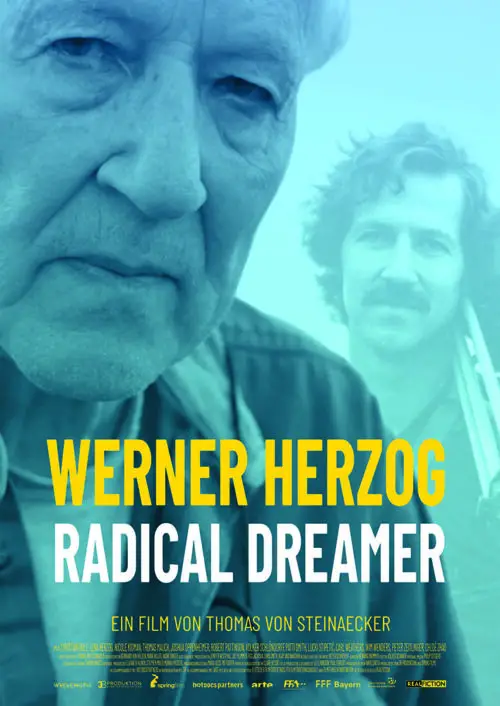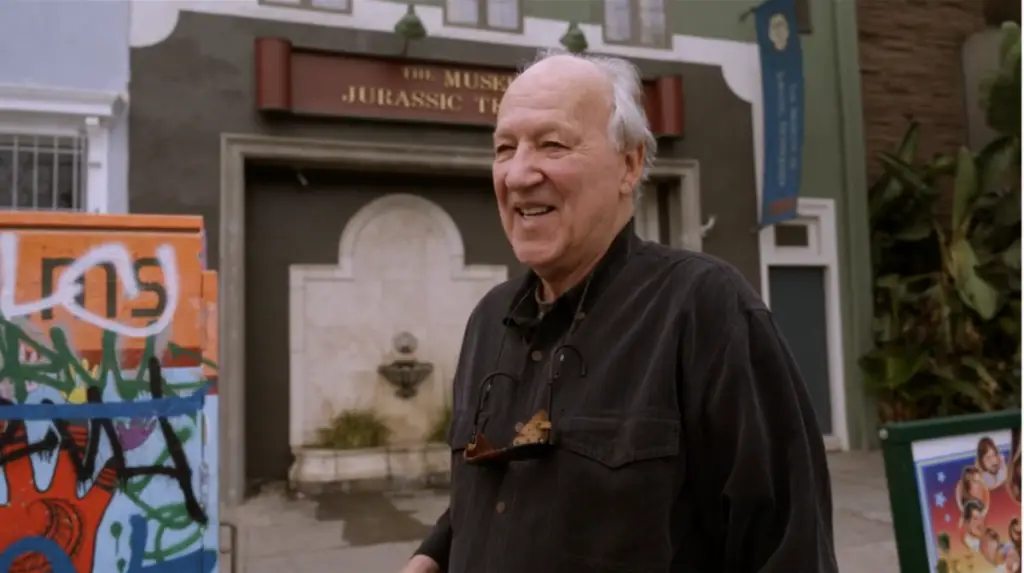
Werner Herzog, throughout a career that goes back to the 1960s, has directed 20 feature films and more than 30 feature-length documentaries. Some of those films, such as Fitzcarraldo, Aguirre: The Wrath of God, and Grizzly Man, are all-time classics. The German-American filmmaker is believed to be the only director to have made films on every continent. And he’s also appeared on everything from The Simpsons to Rick and Morty to The Mandalorian.
Herzog’s unique life and career are the subject of a new documentary called Werner Herzog: Radical Dreamer, which lands on VOD this week, in addition to a new memoir called Every Man for Himself and God Against All. We spoke to that film’s director, Herzog’s fellow German Thomas von Steinaecker, about the film, his experience making it, and what it’s like to hang out with Werner Herzog.
How’s it going?
It’s getting dark outside, but it’s a good time to talk about Werner Herzog, I guess.
Always a good time I guess. Where are you based right now?
Bavaria, Germany.
Wow, that’s great. So, tell me the story, real quick, of how you came to direct this movie.
I’ve always been fascinated by Werner’s work. Starting when I was a teenager, I happened to watch Aguirre: The Wrath of God on television. And then, I was really shocked, in a good way, by this film as a teenager because it was so different from anything else I know. And then I read Of Walking in Ice, which was his first book, his journal, which had the same effect on me. It was a great inspiration for me as a writer.
And from that moment, I always wanted to meet Werner or get behind the mystery as it were, of Werner. Of course, it added to the mystery, that he didn’t live in Germany like Wim Wenders or Volker Schlöndorff, but he lived far away in America, and he also already had become this mythical figure. And then, after a couple of times when I tried to approach him during festivals, or so, in Germany, which was really impossible because so many people wanted to talk to him.

You know, he also had this reputation that it’s really impossible to do a documentary on him or to get some insight into his life as it were. That motivated me even more, to go for the impossible. And then I wrote an email to his company, which is basically just one person, his brother, Lucki, and he immediately wrote back then we had a phone call and we discovered a lot of the same interests we had. And also, I think he liked my way of thinking and my approach, to this documentary, and then he said okay.
‘I don’t decide about this documentary, Werner has to decide, but I can arrange a meeting’ [Lucki said]. And during that time, it was COVID, and it was impossible to fly over to Los Angeles to meet him in person. So then we had to Skype call, and that was different, to put it that way, because he wasn’t interested at all in my approach, or in the films I had done before. We only talked about books and literature. I had sent him some of my novels that he read, and he liked, and we talked about those novels. And then we talked about very obscure poets, from the Baroque Era, and from the 17th Century, who he really loves and who I also happen to like.
After this exchange, which went on for about 90 minutes or so, I finally asked him okay, how about the documentary, after talking about obscure German poets he agreed. And he said okay, let’s do it.
You see a lot about the Werner Herzog persona, the guy you see in interviews, or even when he does a voice on The Simpsons. Are the real guy and the persona the same thing, from spending time with him day to day?
The thing is, I don’t think there’s just one persona of Werner. He has so many different aspects. For example, the problem in Germany is that you always reduce him here to this very serious guy, where you don’t dare to laugh during his films. But he also has this very funny side about him, and he likes to poke fun at himself as well. That might be part of the explanation why he’s become so popular in the States.
About how much time did you end up spending with him?
It took about four months to do the shooting, and I guess one month was spending time with him, in different spots, in different countries.
He’s made so many films in his career. Was it different to decide which films to include, and which ones not to?
That was really tough because I had to leave out some of the films that I really love. For example, Stroszek, that’s one of my favorite films. But it just didn’t fit into the narration in the way I wanted it to fit, so I had to leave it out. But in the end, it was very clear which films had to be in the spotlight. It was clear that Fitzcarraldo had to be at the center of the film. Also, because we had this footage that had never been seen before, the version with Mick Jagger and Jason Robards.
This is a film not only for the American audience but also for a European audience, so it was very important for me to show parts of his American career, like the incredible documentaries he did over there, like Grizzly Man and Encounters at the End of the World. Also, he claims that this is one of his favorite films, Bad Lieutenant [Port of Call New Orleans], which is a great film.
I love his Bad Lieutenant. It’s so different from the original Bad Lieutenant, a completely different kind of very good movie.
It’s also funny, to test this humorous side that people tend to forget.
“Shoot him again, his soul is still dancing.”
Right.
I was in Alaska earlier this year, and I remember thinking ‘Am I anywhere near where Grizzly Man happened?’ It turned it the island next to where I was was where Timothy Treadwell went.
[Laughs]
Do you have a favorite movie of his?
Actually, it’s not in my documentary. It’s The Enigma of Kaspar Hauser. That’s my favorite film, actually.
So, you’re a documentary filmmaker. Have Werner’s documentaries influenced your career, when it comes to how you make them?
Not all all [laughs]. I think my approach is totally different from his approach, to be honest. I think he goes there and sees what happens, and when I do a documentary, I always have a clear plan and schedule – who I’m going to meet and what I want to see and hear.
I know he has a new memoir out, I actually heard him, he went on Conan O’Brien’s podcast earlier this week to talk about it. Is it just a coincidence that the documentary and the memoir are coming out at the same time?
It’s the coincidence of his 80th birthday, I think.
Have you gotten to read the memoir?
I’ve read it, yes. It came out in Germany first, so I had the chance to read it. Again, it’s a different story, different from the story I tell in my documentary. So they complement each other, I think.
Thomas von Steinaecker’s new documentary Werner Herzog: Radical Dreamer is now available on VODs. Will you be checking out this unprecedented look at one of film’s most enigmatic auteurs?



